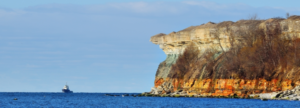Parlamento Europeo vota sulla pesca legale del mare dell’Est
‘Piano UE legalizza la pesca esagerata‘
Europarlamentare Anja Hazekamp chiede ai suoi colleghi nel Parlamento Europeo di votare contro il piano di pesca per il mare dell’Est Europeo. Il piano originale era disegnato per fermare la pesca esagerata del merluzzo e l’aringa nel mare dell’Est. Ma secondo il Partito per gli Aniamli il piano è stato ridotto così tanto che non succederà. “Questo piano non tutela i pesci. Questo piano legalizza la pesca esagerata,” avvisa Hazekamp.

Il Partito per gli Animali critica tra le altre cose l’alzamento della soglia “Maximum Sustainable Yield” (MSY): il punto in cui le acque vengono pescate al massimo. Secondo i presenti accordi europei non si potrà superare la soglia MSY dal 2010. Questo piano del mare dell’Est introduce però delle eccezioni che permette ai pescatori di pescare di più.
“Consentire la pesca esagerata nel mare dell’Est porterà ad ulteriore pesca in altre acque. I pescatori che ora possono pescare nel mare dell’Est per via eccezionale, vorranno queste eccezioni anche per il mare del Nord e il mare Mediterraneo. Questo piano sul mare dell’Est crea un precedente ed apre così la porta a sfruttare ulteriormente tutte le acque europee in modo strutturale. Se questo è il massimo che l’Europa è disposta a fare, allora la pesca finirà solo una volta che i mari saranno per davvero vuote,” dice Anja Hazekamp.
“EU plan legalises overfishing”
MEP Anja Hazekamp calls on her colleagues in the European Parliament to vote against the EU multiannual plan for managing the Baltic Sea. The plan was initially intended to put an end to the overfishing of Baltic Sea cod, sprat and herring stocks. However, according to the Party for the Animals, the Baltic Sea Plan has been mitigated to such an extent that ending overfishing is no longer an option. “This plan does not protect fish; it legalises overfishing,” warns Hazekamp.

Among other things, the Party for the Animals criticises the stretching of the boundaries of the so-called Maximum Sustainable Yield (MSY): the largest yield that can be taken from a species’ stock. From 2020, fishing beyond the MSY limit will not be allowed under the existing European agreements. However, the Baltic Sea Plan introduces exemptions that allow fishermen to cross the MSY limit.
“Allowing overfishing in the Baltic Sea will ultimately lead to overfishing in other waters. Fishermen who are now granted derogations for legally overfishing in the Baltic Sea, will soon demand the same exemptions for the North Sea and the Mediterranean Sea. This Baltic Sea Plan creates a precedent which opens the door to the possibility of a continued structural pillaging of all European waters. If this is all Europe is willing to do, overfishing will not stop until all waters are truly and entirely empty,” according to Anja Hazekamp.